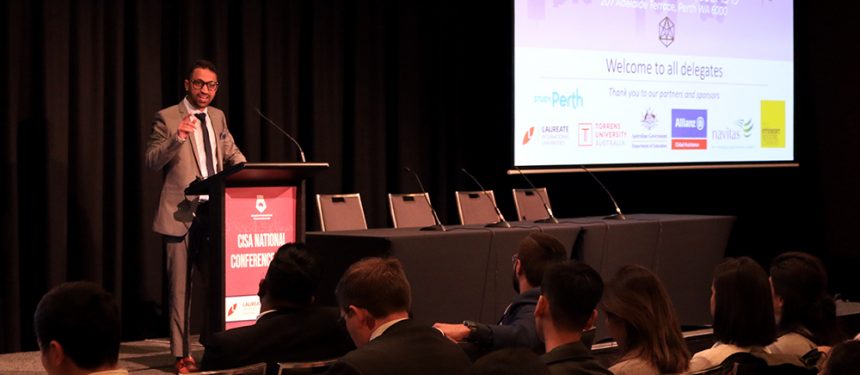International students must make their voices heard to help address concerns, such as workplace exploitation and mental health, delegates have been told at the 2019 Council of International Students Australia conference.
News and business analysis for Professionals in International Education
Have some pie!
CISA 2019: work continues to address ongoing issues for int’l students
 Outgoing CISA president Sapkota urged students to use their voice to help others. Photo: The PIE
Outgoing CISA president Sapkota urged students to use their voice to help others. Photo: The PIE Themed Prism of Possibilities, the 2019 conference brought together more than 300 student delegates from around the country to discuss ongoing concerns within Australia’s international student population.
“CISA and other peak bodies can definitely work on a number of issues”
“Use your voice for the betterment of international students in Australia,” said CISA’s immediate past president Bijay Sapkota.
Held in Perth, Western Australia for the first time, the points of discussion for the 2019 conference saw many of the talking points from the previous year persist, particularly around workplace exploitation and accommodation, with some notable changes.
Recent portrayals of international students in mainstream media and politics were brought up on several occasions, and delegates were told they had a role to play in highlighting the positive aspects of international education.
“We want to change the rhetoric, especially after some negative comments from people and media,” outgoing vice-president Ralph Teodoro said.
“We want to highlight the positive.”
John Wellard, international policy director at Universities Australia, agreed with Teodoro’s observation, adding providers must ensure international students have valuable experiences while studying in Australia.
“At the end of the day, the best advocate we have… is the students that go through an institution themselves,” he said.
Mental health also played a substantial role in this year’s discussions after a report from the Victorian coroner in January found significant barriers for international students to find support.
Sapkota called on both delegates and institutions to help students experiencing mental health concerns, noting that despite best efforts, some providers contributed to problems rather than alleviated them.
“Mental health distress comes because of the procedures in place which compel students to be more stressed,” he said, pointing to providers’ internal bureaucracies as potential squeeze points for international students.
“I think the council should work in recognising what are the procedures.”
The 2019 conference also featured one of the first public panels of representatives from 2017’s Spring Agreement, which brings together four of Australia’s national student bodies to collaborate and work together.
“When you improve the outcomes or the resources for one group, it moves the entire sector to care about [all] students,” explained National Union of Students president Desiree Cai.
“CISA and other peak bodies can definitely work on a number of issues not just for international students, but all students,” added Sapkota.
The work of the Council of Australian Postgraduate Associations and other predominantly domestic student associations in campaigning for international student travel concessions in New South Wales was particularly highlighted.
Provider closures also featured prominently in discussions after CISA received over 100 complaints from international students, particularly at a vocational level, throughout late 2018 and early 2019.
“Use your voice for the betterment of international students in Australia”
Zimbabwean international student, Mellisa Birdas, urged delegates to familiarise themselves with the process of a provider closure in a session on the topic after she was affected by her institution losing its tertiary registration.
“I was in my final semester, and I had studied two and a half years,” she said, adding that she has now transferred to a new institution that requires she complete at least a year of study before being able to graduate.
“You have to be aware before an incident like this happens, so you know who to turn to, you don’t have to panic. You start thinking about your visa,” Birdas continued.
“If you’re unaware of the departments that can help you, it’s difficult.”
As well as holding its annual conference, CISA undertook election for its executive committee and its annual general meetings.
Still looking? Find by category:


